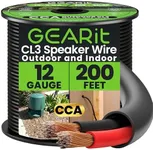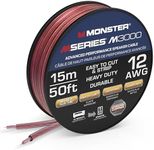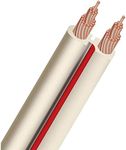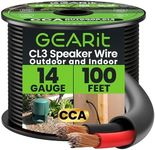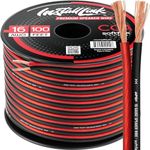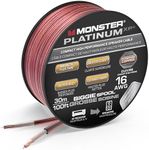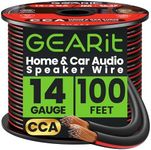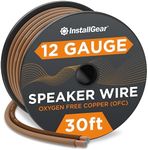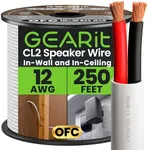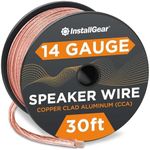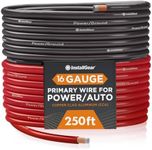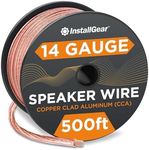Buying Guide for the Best Gauge Speaker Wires
When it comes to picking the right speaker wires, it's important to understand that the quality and performance of your audio system can be significantly influenced by the type of wires you use. The gauge of the speaker wire, which refers to its thickness, plays a crucial role in ensuring that your speakers receive the right amount of power without any loss in sound quality. Here are some key specifications to consider when choosing speaker wires and how to navigate them to find the best fit for your needs.Wire Gauge (AWG)The wire gauge, measured in American Wire Gauge (AWG), indicates the thickness of the wire. This is important because the thickness of the wire affects its resistance and, consequently, the quality of the sound. Lower gauge numbers mean thicker wires, which have less resistance and can carry more power over longer distances. For short runs (under 50 feet), 16-gauge wire is usually sufficient. For longer runs (50-100 feet), 14-gauge wire is recommended. For very long runs (over 100 feet) or high-power applications, 12-gauge wire is ideal. To pick the right gauge for you, consider the distance between your amplifier and speakers, as well as the power requirements of your audio system.
MaterialSpeaker wires are typically made from copper, but you may also find wires made from aluminum or copper-clad aluminum (CCA). Copper is the most common and preferred material because it has excellent conductivity and low resistance, which ensures better sound quality. Aluminum and CCA wires are cheaper but have higher resistance, which can affect performance, especially over longer distances. If you want the best sound quality, opt for pure copper wires. If you're on a budget and the wire runs are short, CCA wires can be a reasonable alternative.
Insulation and JacketThe insulation and jacket of the speaker wire protect the conductive material from physical damage and environmental factors like moisture and heat. Good insulation ensures that the wire remains durable and safe to use. Common materials for insulation include PVC, polyethylene, and Teflon. For most home audio applications, PVC insulation is sufficient. However, if you need wires for outdoor use or in-wall installations, look for wires with more robust insulation like polyethylene or Teflon, which offer better protection against the elements. Choose the insulation type based on where and how you plan to use the wires.
LengthThe length of the speaker wire is crucial because it needs to be long enough to connect your amplifier to your speakers without being too long, which can cause signal loss. Measure the distance between your amplifier and speakers, and add a little extra length to account for routing around furniture or other obstacles. It's better to have a bit more wire than you need than to come up short. However, avoid excessively long wires as they can degrade the sound quality. Choose a length that provides a comfortable fit for your setup without unnecessary excess.
ConnectorsSpeaker wires can come with various types of connectors, such as banana plugs, spade connectors, or bare wire ends. Connectors make it easier to attach the wires to your speakers and amplifier, providing a secure and reliable connection. Banana plugs are popular for their ease of use and secure fit, while spade connectors offer a tight connection that is less likely to come loose. Bare wire ends are the most basic and can be used with spring clip terminals. Choose the type of connector based on the terminals on your speakers and amplifier, and consider ease of installation and connection stability.
